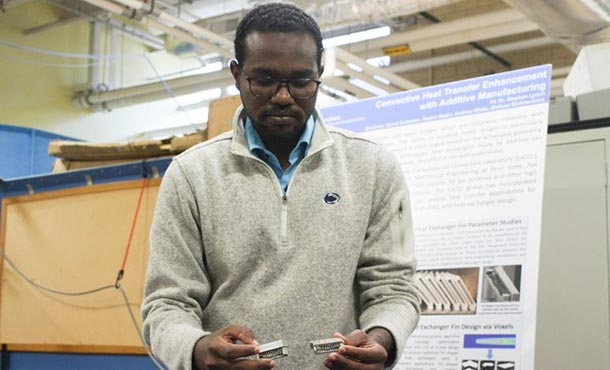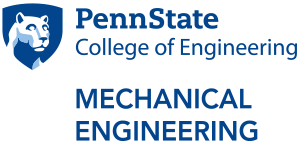
Bashir Mekki, a Penn State doctoral student in mechanical engineering, works with additive manufactured parts in the Experimental and Computational Convection Lab on the University Park campus. IMAGE: ERIN CASSIDY HENDRICK/PENN STATE
Mechanical engineering grad student launches research with NASA fellowship
Doctoral candidate Bashir Mekki, who recently obtained U.S. citizenship, studies how aircrafts manage their engines' extreme heat generation
11/20/2019
By Sarah Price
UNIVERSITY PARK, Pa. — Since his childhood, Bashir Mekki, a doctoral candidate studying mechanical engineering at Penn State, has always been fascinated by how planes fly. Now, thanks to his doctorate research and a recent NASA fellowship in the area of multifunctional heat exchanger design for integrated lightweight thermal management systems in aircrafts, he’s exploring that mystery.
“While growing up in a remote village in Sudan, flying in an airplane was never a possibility even in my wildest dreams,” Mekki said.
A few months before graduating from the University of Khartoum in Sudan, Mekki received the news that changed his life. He was selected for the Diversity Visa Program and was granted permanent residency status in the United States. Even though he did not speak English at the time, Mekki dedicated himself to learning the language and in tandem, earning a second bachelor’s degree in mechanical engineering at Penn State Harrisburg in 2016. He eventually went on to earn American citizenship in April of 2019.
“I was very fortunate to be among the selectees for the Diversity Visa Program that granted me the opportunity to work and live in the U.S. and I am not taking that opportunity for granted,” Mekki said. “I continue to unravel the mystery [that fascinated me during] my childhood by learning more about the science behind it.”
Specifically, he focuses his energy on researching how aircrafts withstand and manage the extreme amount of heat their engines generate. Thermal management systems for aircraft are becoming a major engineering challenge for a variety of applications. These concerns are amplified with hybrid electric propulsion, with NASA leading the development of this technology. However, the gap in knowledge of thermal management requirements is important to close before electrified aircrafts can take to the skies.
This is where Mekki wants to make his mark.
“When I learned about the principles of heat transfer, fluids and thermodynamics in college, I immediately fell in love with this subject,” he said.
Currently, heat exchanger design is generally restricted to shapes that have well-known performance characteristics, like pressure drop and heat transfer, where the shapes are very often limited by manufacturability. This also limits the ability to integrate the thermal management system within the confines of the aircraft. Mekki’s research focuses on creating a design tool that generates organic shapes, that can be manufactured using emerging advanced manufacturing capabilities such as additive manufacturing, to enable highly integrated heat exchanger designs.
Throughout his undergraduate studies in Sudan and the U.S., Mekki continually found his greatest successes were achieved in the areas of problem solving, teamwork and technical research capabilities.
Building on that work, he moved to Penn State’s University Park campus to complete his graduate degree through his research in the Experimental and Computational Convection Lab (ExCCL), a mechanical engineering lab led by Stephen Lynch, the Shuman Family Early Career Professor and associate professor of mechanical engineering.
“I am fortunate to be part of Dr. Lynch’s research group. He provides us with valuable guidance and support to achieve the highest possible standards in research, and to prepare us for a successful career,” Mekki said of his adviser, whom he considers a role model.
Mekki explained that his experiences at Penn State Harrisburg and in industry, along with leadership from Lynch, helped him to adapt quickly to graduate school.
“I believe this opportunity to do research at NASA facilities and under the guidance of its experts will profoundly enhance my knowledge and experience to achieve my research goals,” he said.


